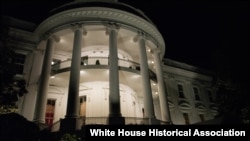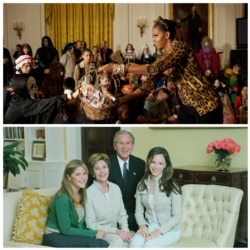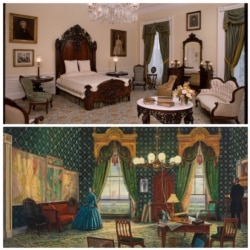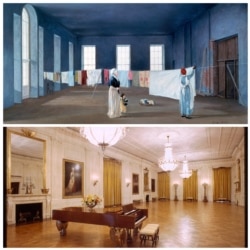In 2009, then-first lady Michelle Obama told visiting school children that she and President Barack Obama sometimes heard strange noises in the hallway at night. And other times some Obama family members felt like something was gnawing or chewing on their feet.
Folklorist Debra Lattanzi Shutika, who knows a thing or two about ghost stories, thinks the specter of a long-dead White House pet might be responsible for the nipping at people’s feet, and she wouldn’t be surprised if the Obamas heard from the White House’s most popular ghost, President Abraham Lincoln.
“I imagine that President Lincoln was really proud to have an African American family in the White House after the sacrifices he made,” says Lattanzi Shutika, an associate professor at George Mason University. “But as far as the unexplained sounds and feelings, I would chalk that up to there just being spiritual energy in the house from people who've been there before.”
The Obamas aren’t the sole White House occupants to report strange happenings at 1600 Pennsylvania Avenue.
Jenna Bush Hager, the daughter of President George W. Bush, who served from 2001 to 2009, said she and her twin sister Barbara once heard 1920s piano music coming from the fireplace in their bedroom.
And Ronald Reagan, president from 1981 until 1989, told the story of how his dog barked frantically at the entrance of the Lincoln Bedroom and refused to go inside. Reagan’s daughter and son-in-law also reported seeing an apparition in the room.
Famed British leader Winston Churchill also claimed to see Lincoln’s ghost when he stayed in the Lincoln Bedroom. Lincoln, who was assassinated in 1865, never slept in the chamber but he did use it as an office.
“It has this really well-known bed called the Lincoln bed that was purchased by Mary Todd Lincoln during their time in White House and it's unlikely that he actually slept in the bed, but other presidents have slept in the bed,” says White House Historical Association historian Lina Mann. “And, of course, since that was a space where he had an office, it is like the Lincoln room.”
Mann says White House ghost stories often revolve around 19th century situations and most ghost sightings relate to the slain president who presided over the Civil War.
“I think that that makes a lot of sense,” Mann says. “He was assassinated before his time; it was dramatic; it was at the conclusion of the Civil War, right before reconstruction, and that really altered the course of American history. And, of course, his death was brutal.”
Lincoln had unfinished business, which is a common theme when it comes to American ghost stories.
“The lesson is that one should get your affairs in order,” says Lattanzi Shutika. “Make sure that you don't have unclosed chapters in your life so that when you do die, you can rest in peace.”
“Oftentimes those stories are basically to help confirm what I think most people believe, that there is an afterlife,” Lattanzi Shutika adds, “and that while we may not have a common belief system across the country about what happens to our entities once we're dead, that there is something beyond the life that we see here.”
White House staff have also reported seeing apparitions.
“There was a man named Jeremiah Smith, and he worked in the White House for 30 years starting in the Grant administration,” Mann says. “He started as a footman and then served many roles in the White House, and he claimed to have seen a ton of ghosts, including ghosts of Lincoln, [President Ulysses S.] Grant, [President William] McKinley, also several first ladies, so he definitely helped spread a lot of those late 19th century ghost stories around.”
In 1911, President William Taft admonished one of his military aides for writing about a White House apparition that supposedly alerted the living to his presence with a ghostly tap on the shoulder. Taft threatened to fire any staffers who repeated the story.
Houses are common settings for ghost stories and can play an active part in them. The White House’s fame, age and history make it an ideal setting for stories about things that go bump in the night.
“There's a lot of institutional history just within the architecture itself,” says Lattanzi Shutika of George Mason. “A lot of people believe that we leave imprints on the places we inhabit. We take a space, do our daily lives or interactions, we make them meaningful places. And the White House is, you know, when you think about the Republic, is one of the most meaningful places because it's the residency of the presidency.”
So have the current occupants of the White House, President Donald Trump and family, reported any ghost sightings?
“Not that I've heard,” Mann says. “It usually takes a while for ghost stories to proliferate through, so maybe in a few years we'll start hearing some more.”











